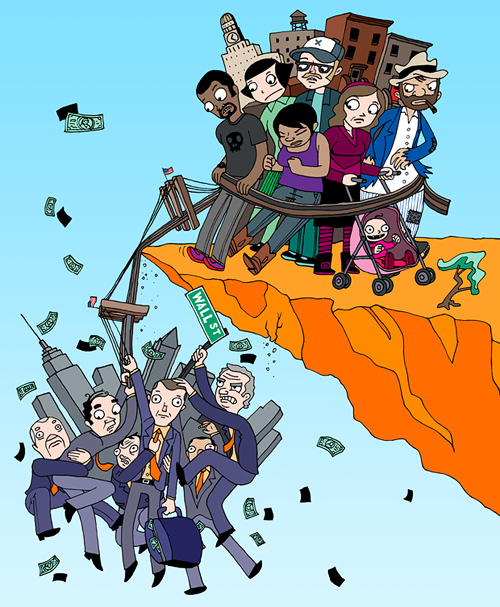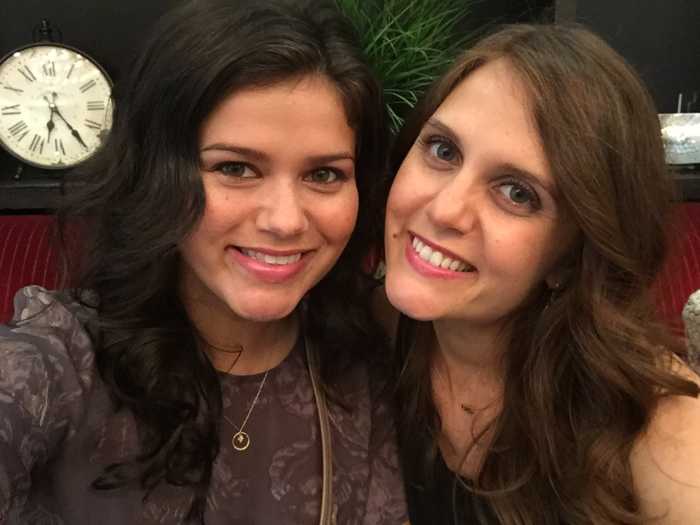Snapshots from a borough on the brink:
A barista at a fancy Court Street coffee shop spills out all the unsold java at the end of yet another quiet day.
A just-laid-off Lehman Brothers worker heads straight to her local video store — pink slip still in hand — and rents two brainless comedies.
A home-seller picks up the phone and does what was once unthinkable: he calls an early low bidder and asks if the offer, once considered too paltry to consider, still stands.
A Park Slope rabbi sends out a comforting e-mail to his jittery congregation.
Taken together, it adds up to this: Manhattan has caught a cold from the fiscal meltdown on Wall Street, but Brooklyn has come down with a case of the shakes.
The shockwaves from the economic crisis are reverberating to Bangkok and back — but for the first time (since the last time, that is), the tremors are being felt in our borough, which had long been insulated from America’s fiscal doldrums, thanks to soaring property values and the trickle-down effect from billions in Wall Street bonuses.
“I’m worried — everyone is worried,” said Sandy Sawotka, who works at the Brooklyn Academy of Music and lives in Park Slope.
“Everything I’ve saved in my life is in mutual funds — and I’m afraid to look at the next statement. In fact, I won’t look at it. I’ve lost 10 percent of my money this year already.
“I haven’t felt times this difficult in a long time,” she said, citing the soaring cost of food staples.
Sawotka said she realizes that she’s not alone in her anxiety — but she doesn’t know if that makes her more, or less, anxious.
The big problem now is that much of the confidence that Brooklynites enjoyed over the past few years has been inexorably linked to “the city” on the other side of the East River.
Each of the 188,000 financial industry jobs is said to support two more jobs elsewhere: nannies, car mechanics, baristas, shrinks, dry cleaners, all of whom survive on Wall Street cash, even if they can’t read a balance sheet or understand why the Dow Jones Industrial Average rises and falls.
Roughly 40,000 financial sector jobs are expected to be lost in the latest contraction. And Brooklyn will feel the pain.
It won’t just be the man on the street, either. Our largest institutions will have to make do with less. The roster of patrons at the Brooklyn Museum last year reads like the “Losers” side of the Wall Street ledger: Goldman Sachs gave $25,000 last year. The NYSE, $15,000. And Bank of America, Morgan Stanley and (oops!) Lehman Brothers gave $10,000.
The Brooklyn Chamber of Commerce had the unfortunate luck to be holding its annual meeting on Wednesday, just as the full extent of the Wall Street collapse sank in.
At the St. Francis College podium in Brooklyn Heights, Chamber officials tried a little gallows humor.
When he introduced Marisa Lago, the new head of the state agency overseeing Atlantic Yards and Brooklyn Bridge Park, outgoing Chamber Chairman Dan Holt sarcastically said, “She probably couldn’t have picked a better time” to start that job.
Lago riffed, too.
“I left Wall Street on Aug. 29. It was a different era,” she said.
But as liquor liberated the tongues of the rank and file at the cocktail reception afterwards, wounded entrepreneurs had a more serious tone about the future.
“We’ve noticed a drop recently,” said Sherry Argueta, manager of All Car Rent A Car, who said the topsy-turvy market only exacerbated an earlier decline from surging gas prices. “We’re trying to keep our heads above water.”
The manager of a high-end restaurant and low-end pizzeria said he is doing a booming business on slices, but suddenly no one is buying the $26 veal chop.
“Customers are asking about the prices all the time,” said John Esposito, manager of Sal’s Pizzeria, which is on Court Street between DeGraw and Sackett streets in Cobble Hill and shares ownership with the higher-end Mama Maria’s restaurant next door.
“We’re doing fine, but the restaurant isn’t,” he added. “We’re expecting a very gloomy Christmas.”
So are two coffee bars on Court Street.
“We have so much wastage at the end of the day,” said a manager at Bococa’s, between Bergen and Wyckoff streets. “Rush hours are dead now.”
“They’re much more hesitant to buy a latte, too,” added Matt, a barista at the Tea Lounge, between Kane and Butler streets. “They think twice about getting fanciful items.” As a result, the shop has cut back on orders from outside suppliers — which sends the pain traveling further down the economic food chain.
Indeed, whenever one person starts to panic, it costs someone else real money.
“I have a two-bedroom [rental] on the market in Brooklyn Heights that was just reduced from $2,800 to $2,670,” said Lauren Caputo, a broker for Century 21 whole handles sales and rentals in DUMBO, Brooklyn Heights, Downtown and Clinton Hill. “Offers are coming in — and they’re lower. And sellers are coming back to people that made lower offers at one time and saying, ‘Is that offer still standing?’”
Sensing the downward trend, Caputo says she is cooking her own meals more now and has even changed all her lightbulbs over to fluorescent, energy-efficient bulbs. It hasn’t helped put that much more money in her wallet, but she said she likes the psychological benefit of the marginally smaller electric bills.
But this crisis is not just a mental game; people are hurting:
• “Things are slowing down rapidly,” said Al Pankin, manager of a U.S. Auto School in Downtown. “We have a class of nine people up there now. We should have 20.”
• “People aren’t buying as many dog beds as before,” said Malcolm Smart, owner of Top Dog, a Park Slope pet supply store. “Luxuries are definitely being cut down. At the kennel, I’ve seen a downturn in boarding. People aren’t traveling as much.”
• “My sales for luxury pieces are 25 percent less than what they should be,” said Robert Lopez, the owner of Artesana Home, a rug store in Park Slope. “Customers think twice now. They want to hold on to what they got, just like me. They’re buying the basics.”
• “People are getting their color redone every six weeks instead of four,” said Heather Mills, owner of Medusa Hair Salon in Park Slope.
After hearing a similar litany of worries from his congregation, Rabbi Andy Bachman at Congregation Beth Elohim in Park Slope not only sent out an e-mail to his entire membership, but spoke about the economic downturn in a recent sermon.
“I wanted people to know that we are a community and we are there for you,” he said. “People really needed to hear it. Work is essential to human dignity, so it’s so hard for people to face their fear, especially in public.”
Sawotka, the Park Sloper who kept her window guards in place, knows the fear. A survivor of the city’s 1970 nadir, she said she’s on the verge of doing things she hasn’t done since those dark days. “We used to carry ‘mugger money,’ remember that? People today have let their guard down.”
One final indication that we are heading into some dismal times? Sales reps for the state lottery are getting aggressive about pushing their product, the one that only takes a dollar and a dream.
“I know things are bad because the sales representative has been in here three times more than usual this month,” said Tim Murawski, owner of Murawski Pharmacy in Greenpoint. “She wants to make sure they’re getting optimal sales because there’s a slump.”






















